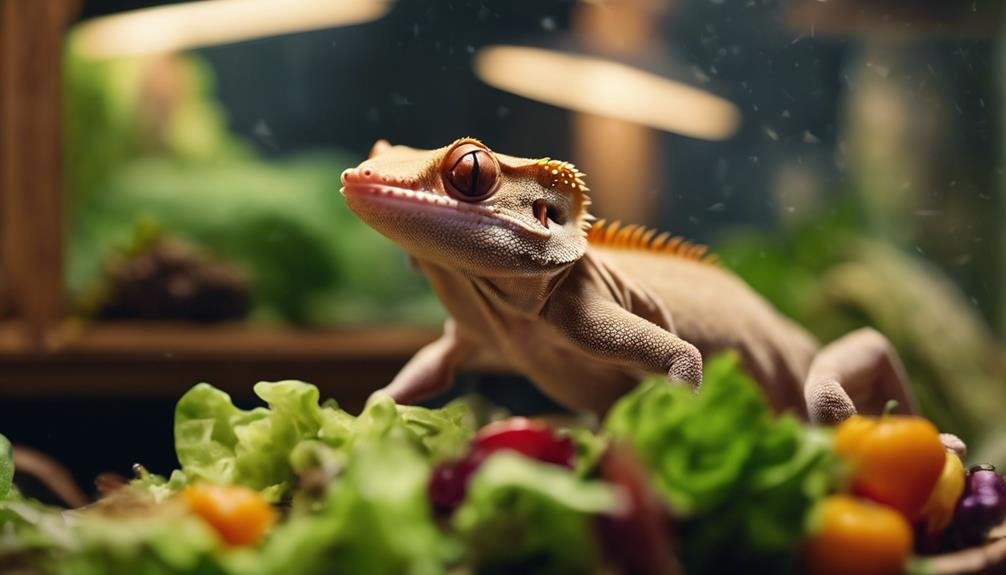You might wonder whether you can toss a bit of lettuce into your crested gecko's diet for a quick salad fix. However, it's important to understand that lettuce, while convenient, falls short in providing the essential nutrients these unique pets need. Instead, focusing on dark leafy greens like kale and collard can make a significant difference in their health. But that's just scratching the surface. There are a plethora of suitable foods that can enrich your gecko's diet far beyond the basics, ensuring they receive a well-rounded and nutritious meal plan. Curious about what these are? Let's explore the alternatives that can keep your crested gecko thriving.
Key Takeaways
- Crested Geckos can eat lettuce, but it's nutritionally poor and not recommended.
- Lettuce is high in water but lacks essential nutrients like calcium and vitamins.
- Offer dark leafy greens such as collard, mustard, and turnip greens instead.
- Fruits like apples and kiwi can be occasional treats, but limit high sugar content.
- Include insects and meal replacement powders (MRPs) for a balanced diet.
Lettuce in Their Diet
Incorporating lettuce into your crested gecko's diet isn't recommended due to its minimal nutritional value and high water content. While it might seem like a fresh and hydrating option, lettuce falls short in providing the essential nutrients your gecko needs for best health. It's important to focus on creating a complete gecko diet that supports growth, vitality, and longevity. The low nutritional value of lettuce can lead to nutrient deficiencies over time, potentially causing more harm than good.
Moreover, relying heavily on lettuce could introduce digestive issues in your crested gecko. Its high water content and lack of fiber can disrupt the normal digestive process, leading to discomfort and other health concerns. Instead, consider dark leafy greens like kale, collard greens, and mustard greens as alternative foods. These greens aren't only rich in calcium, vitamin A, and fiber but also contribute to a more balanced and nutritious diet.
Nutritional Concerns
Curious about how lettuce compares nutritionally for your crested gecko?
We'll delve into the nutrient content of lettuce and why it may not fully meet your pet's dietary requirements.
Furthermore, we'll investigate how this affects their health and what superior food alternatives are available.
Nutrient Content Analysis
When examining the nutrient content of lettuce, it becomes clear that it lacks the essential nutrients, such as calcium, phosphorus, and vitamin A, important for the health of crested geckos. This deficiency can lead to nutrient deficiencies, impacting their overall well-being.
Unlike low-nutrient foods like lettuce, dark leafy greens such as collard greens, mustard greens, and dandelion greens offer a higher nutritional value, necessary for maintaining a balanced diet. To avoid the pitfalls of feeding your crested gecko lettuce, you should opt for these alternative foods.
Incorporating a variety of leafy greens, vegetables, and fruits ensures that your crested gecko receives the nutrients it needs without relying on lettuce, which does little to promote health and vitality.
Health Impact Considerations
Feeding your crested gecko lettuce regularly can lead to health issues due to its low nutrient content and high water composition. While it might seem like an easy option, lettuce doesn't meet the complete crested gecko needs for a healthy diet.
To avoid the risk of digestive problems and nutrient deficiencies, you should avoid lettuce and instead focus on foods that provide the necessary vitamins and minerals. Feed insects as a primary source of protein and supplement with dark leafy greens like collard greens, mustard greens, and dandelion greens.
Offering a variety of vegetables and fruits, such as carrots, squash, and berries, will make sure your crested gecko receives a balanced diet. Always research alternative foods to keep your crested gecko healthy and thriving.
Recommended Leafy Greens
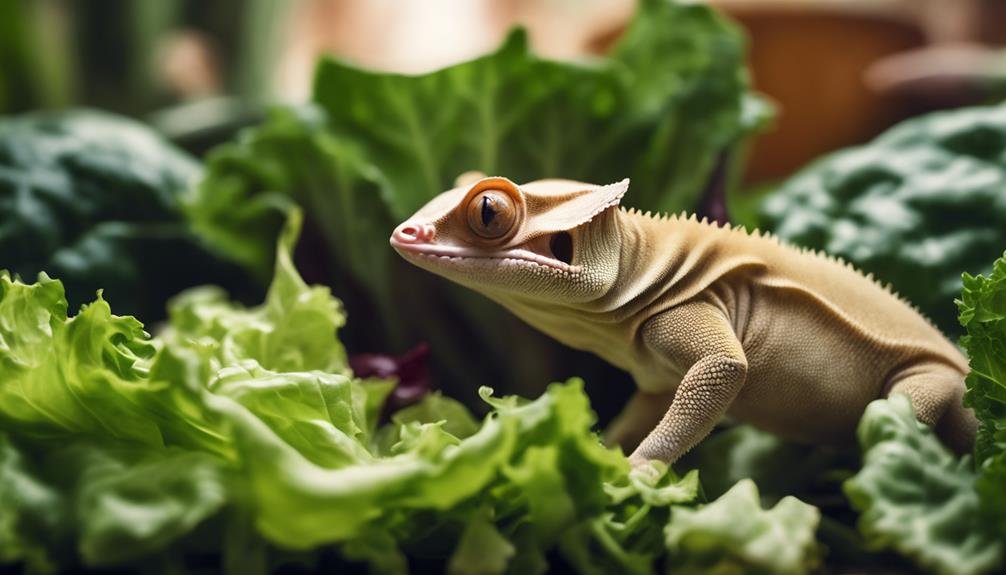

Now that you're aware of the nutritional concerns, let's talk about which leafy greens you should be feeding your crested gecko.
You'll want to stick to options like collard, mustard, and turnip greens, which are packed with calcium and essential nutrients.
Just make sure to steer clear of iceberg lettuce, as it's low in nutrients and could lead to digestive problems for your pet.
Safe Leafy Greens
Incorporating safe leafy greens like collard, dandelion, mustard, and turnip greens into your crested gecko's diet boosts their health with essential nutrients. These greens aren't only rich in calcium, which might reduce the need for calcium supplements, but they also provide a variety of vitamins important for your gecko's wellbeing.
Here's a quick guide:
- Collard Greens – High in vitamins and minerals.
- Dandelion Greens – Offer a boost of calcium and vitamin K.
- Mustard Greens – Packed with vitamins A, C, and E.
- Turnip Greens – Another excellent source of calcium and antioxidants.
To ensure a balanced nutrient intake, rotate these greens regularly. Always remember to wash them thoroughly to avoid feeding your gecko harmful pesticides or contaminants. This way, you maintain a healthy, balanced diet for your pet.
Avoid These Greens
While it's beneficial to include a variety of leafy greens in your crested gecko's diet, it's equally important to know which ones to avoid, such as lettuce, due to its lack of essential nutrients and potential to cause digestive issues. Lettuce, with its high water content, is particularly unsuitable, offering little in the way of the vitamins and minerals your pet needs to thrive.
Instead, focus on healthier alternatives that can bolster their health. Opt for leafy greens like collard greens, kale, dandelion greens, and arugula. These options provide a robust mix of nutrients essential for your crested gecko, ensuring they receive a well-rounded and nutritious diet.
Variety isn't just the spice of life; it's a cornerstone of dietary health for your gecko, avoiding the pitfalls of unsuitable choices like lettuce.
Fruit Treats
You can spice up your crested gecko's diet with mashed soft fruits as occasional treats, making sure they're both a delight and nutritionally suitable. While fresh fruit can offer a variety of vitamins and minerals, it's important to limit high-sugar fruits to prevent obesity and other health issues.
Here are four appropriate fruits to contemplate:
- Apples: A great source of fiber, but make sure they're peeled and mashed to prevent any choking hazards.
- Kiwi: Packed with Vitamin C, kiwi can be a healthy treat, but it should be offered in small amounts due to its acidity.
- Strawberries: These are high in antioxidants but also in sugar, so they should be given sparingly.
- Blueberries: Another antioxidant-rich option, blueberries should be mashed and offered in moderation.
Live Feeders
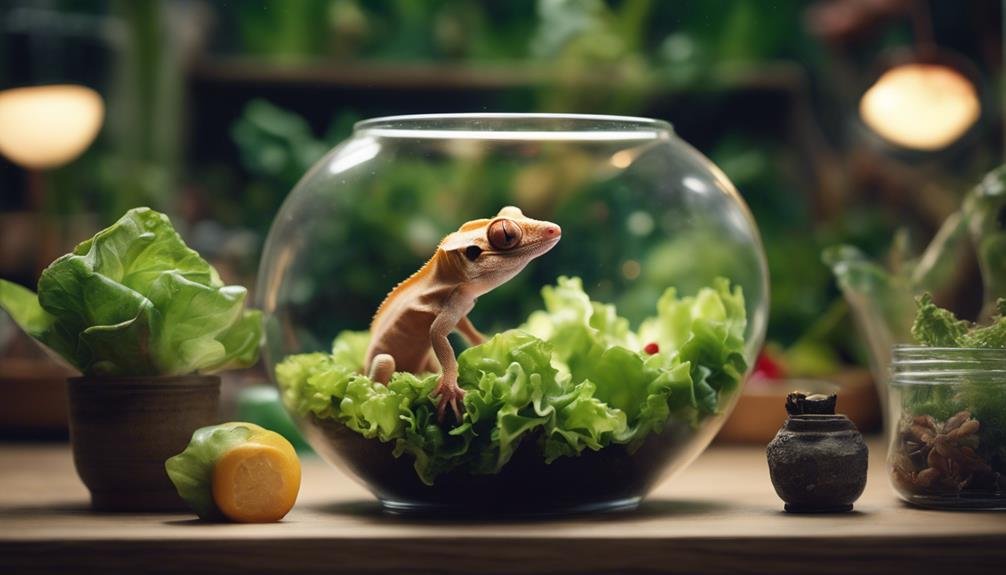

Live feeders, including insects like dubia roaches and crickets, are essential for providing your crested gecko with the protein and nutrients needed for a well-rounded diet. These live feeder insects are not just a treat; they're a complete meal that mimics what geckos feed on in the wild. Making sure these insects are properly sized is important to prevent any harm or difficulty during consumption.
Incorporating a variety of live feeders like superworms, nutrigrubs, and silkworms enriches your gecko's diet, closely resembling their natural diet. It's crucial to gut-load these insects with nutritious foods before offering them to your gecko, enhancing the overall nutritional value of their meal.
Here's a quick guide to some popular live feeders:
| Live Feeder | Protein Source | Notes |
|---|---|---|
| Dubia Roaches | High | Less risk of escape |
| Crickets | Moderate | Stimulate hunting instinct |
| Superworms | High | For occasional treats |
| Mealworms | Moderate | Make sure they're properly sized |
| Silkworms | High | Soft, easy to digest |
Choosing the right live feeders ensures your crested gecko receives the nutrition they need to thrive, promoting a healthy and active lifestyle.
Meal Replacement Powders
Shifting focus to an essential component of crested gecko nutrition, Meal Replacement Powders (MRPs) offer a convenient and balanced dietary option. These powders are a staple in the diet of the crested gecko, guaranteeing your pet gets all the essential nutrients it needs for a thriving life. Let's explore why MRPs are such a good feeding choice:
- Complete Nutrition: MRPs are designed to mimic the natural diet of crested geckos in the wild, providing a balanced and complete source of nutrition. This means you're covering all your crested gecko's dietary bases with just one product.
- Easy to Prepare: Coming in powdered form, MRPs are mixed with water to create a smooth paste. This makes mealtime hassle-free and ensures your gecko can easily consume its food.
- Variety of Flavors: Commercial MRP brands like Repashy and Pangea offer a wide range of flavors and formulations. This variety not only caters to the specific dietary needs of your crested gecko but also keeps them interested in their meals.
- Health and Vitality: Regular feeding of MRPs helps maintain the health, vitality, and overall well-being of crested geckos in captivity, making it a foundational aspect of good feeding practices.
Supplemental Nutrition
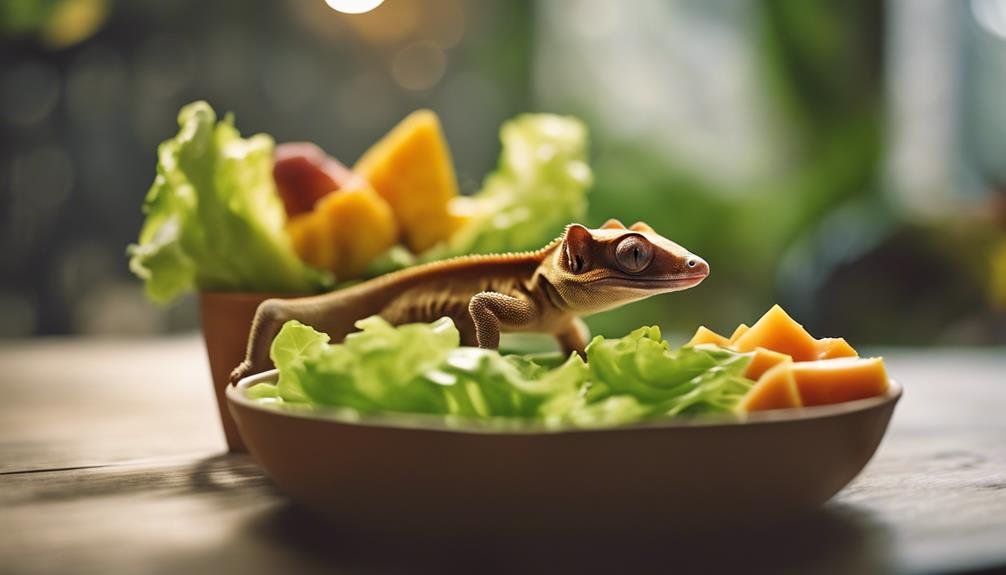

While commercial diets form the backbone of your crested gecko's nutrition, incorporating a variety of supplemental foods can enhance their overall health. It's understood that lettuce, while not harmful, doesn't offer the nutritional density your pet needs. Instead, look towards alternative greens such as collard greens, dandelion greens, and mustard greens. These alternatives provide a richer source of essential vitamins and minerals, essential for your crested gecko's health.
In addition to these greens, considering fruits as treats can add a delightful variety to their diet. Fruits like papaya, mango, and figs aren't only enjoyed by cresties but are also packed with beneficial nutrients. However, it's important to remember that these should be given in moderation, complementing the primary nutrition from commercial crested gecko diets.
Adopting a varied diet approach ensures your crested gecko receives a balanced mix of nutrients. This can significantly contribute to their best health and well-being. By offering supplemental nutrition through carefully selected alternative greens and occasional fruit treats, you're not just feeding your pet; you're nurturing them with a diet that mirrors the diverse, nutrient-rich menu they'd find in their natural habitat.
Water and Hydration
After exploring the variety of foods beneficial for your crested gecko, it's important to focus on their hydration needs. Proper hydration is vital for their overall health and well-being. Since lettuce has low water content and doesn't notably contribute to their hydration, you'll need to make sure they've access to adequate water sources.
- Provide a shallow water dish in their enclosure. This allows them to drink whenever they need, ensuring they stay hydrated.
- Mist their habitat daily using a spray bottle. Crested geckos often prefer to lick water droplets off leaves, mimicking their natural environment.
- Refresh the water dish regularly with fresh water. This prevents the buildup of bacteria and encourages your gecko to drink more often.
- Monitor their hydration levels closely. Proper hydration supports their digestive system and overall health.
Feeding Schedule
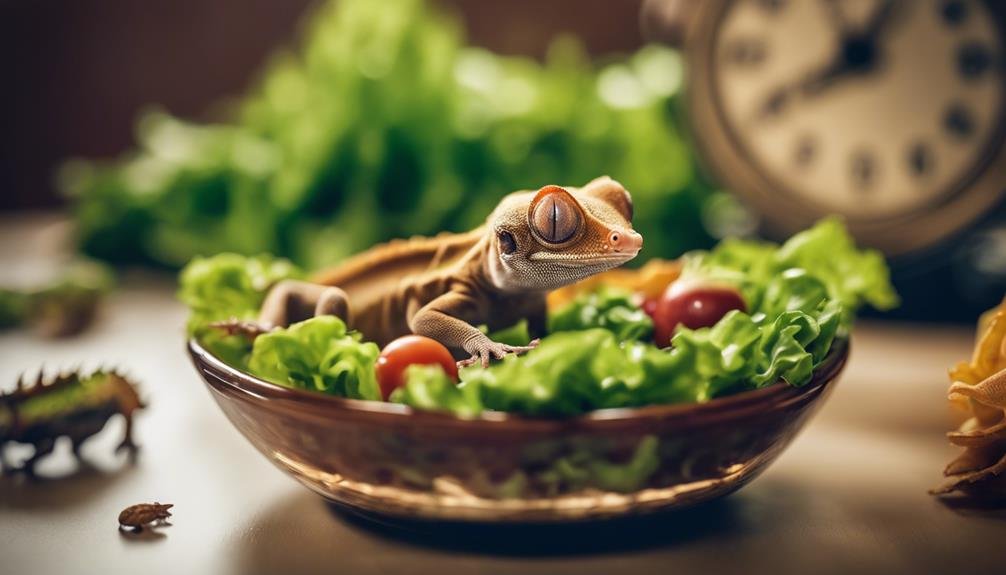

Establishing a regular feeding schedule is essential for your crested gecko's health and well-being. To make sure they receive proper nutrition, it's important to know when and what to feed their crested geckos. Unlike high-water content foods like lettuce, which should be avoided due to their lack of nutrients and potential to cause hydration issues, your gecko's diet should be rich in nutritious alternatives. Incorporating commercial crested gecko food, which is specially formulated to meet their dietary needs, is a great foundation.
You should complement this with a variety of live insects and occasional fruits to provide a balanced diet. Foods such as collard greens, dandelion greens, and squash offer essential vitamins and minerals, making them excellent choices. Stick to a consistent feeding schedule, offering food in the evening when your gecko is most active. Young geckos may require daily feeding, while adults can be fed every other day. Remember, a varied diet not only ensures your gecko gets the necessary nutrients but also keeps mealtime interesting for them.
What Are Safe and Nutritious Alternatives to Lettuce for Crested Geckos?
When planning a crested geckos feeding schedule, it’s important to consider safe and nutritious alternatives to lettuce. Opt for leafy greens like collard greens, dandelion greens, and mustard greens, as well as fruits such as papaya and mango. These options provide essential nutrients for your pet’s health.
Frequently Asked Questions
What Is Everything Crested Geckos Can Eat?
You're wondering what crested geckos can munch on? They thrive on a mix of commercial diets, important for balanced nutrition, and a variety of fruits, offering essential benefits.
Don't forget live insects for protein, and always sprinkle calcium supplements on their food. Hydration's key, often provided through their diet, so keep it juicy.
Optimizing their feeding schedule guarantees they get everything they need. This combo keeps your gecko healthy and happy.
What Food Can Crested Geckos Not Eat?
You shouldn't feed your crested geckos lettuce or any toxic fruits, as they're harmful. Be cautious with insect feeding risks, ensuring they're safe and nutritious.
Remember, these nocturnal eaters need their calcium supplementation for bone health, and it's essential to hydrate them through their diet. Stick to the feeding frequency guidelines to keep them healthy.
Swap lettuce for nutrient-rich greens to avoid nutritional deficiencies and support their overall wellbeing.
What Veggies Can Crested Geckos Eat?
You're probably wondering what veggies you can feed your crested gecko, right? Stick to safe fruits and vegetables like kale, collard greens, and sweet potatoes. Prepare these veggies by washing and chopping them into small pieces.
Feeding frequency should be balanced, and consider using nutritional supplements to boost their diet. For hydration, mist their habitat regularly. Whenever possible, choose organic options to avoid pesticides, ensuring your crested gecko stays healthy and happy.
Can Crested Geckos Eat Honey?
Yes, you can feed your crested gecko honey, but it's important to do it sparingly. Honey's nutrition analysis shows it's high in sugar, so safe serving sizes are small, about a pea-sized amount diluted in water.
This natural sweetener offers benefits but beware of the risk of allergic reactions. Limit honey feeding to occasional treats to prevent health issues, ensuring it's part of a balanced diet for your pet's well-being.
Conclusion
To wrap up, you shouldn't feed your crested gecko lettuce due to its lack of essential nutrients. Opt for nutritious leafy greens like kale, collard greens, and mustard greens instead.
Mixing in fruits, live feeders, and meal replacement powders can also enhance their diet. Don't forget to supplement with calcium and vitamins for peak health.
Make sure they have access to water and stick to a regular feeding schedule to keep your gecko thriving. By choosing the right foods, you'll prevent health issues and support their well-being.

